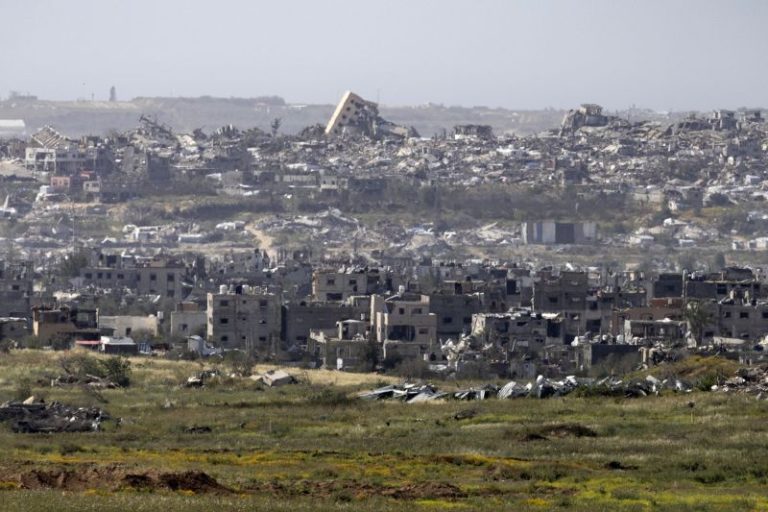When paramedic Hassan Hosni Al-Hila felt too sick to continue his late-night assignment with the Palestine Red Crescent Society on March 23, his son gladly agreed to cover his shift.
That shift would prove to be 21-year-old Mohammad’s last.
Within a few hours, while the young paramedic was dispatched with a convoy of emergency vehicles to find a missing ambulance crew in Rafah, southern Gaza, Mohammad called his father pleading for help amidst intense Israeli military gunfire.
“’Come to me, Dad, help me… we were targeted by the Israelis, and they are now shooting at us directly,” Al-Hila recalled his son telling him over the phone. “The call ended after that.”
His fate would remain unknown for over a week, until rescue teams granted permission by the Israeli military to access the area uncovered a horrific scene: a mass grave containing the bodies of 15 first responders buried along with their crushed emergency vehicles.
A growing trove of evidence detailing the final moments of the first responders has blown apart the Israel Defense Forces’ (IDF) initial narrative of what unfolded that day, in which it claimed without offering evidence that some vehicles were moving suspiciously without headlights or flashing lights toward the Israeli troops and that members of the emergency teams were militants.
“All the claims raised regarding the incident will be examined through the mechanism and presented in a detailed and thorough manner for a decision on how to handle the event,” the IDF said in a statement Monday.
According to an Israeli military official, troops from a brigade that had set up an ambush opened fire on the emergency crews that morning, after intelligence had deemed their movements “suspicious,” and believed they had successfully carried out an attack on Hamas and Palestinian Islamic Jihad militants.
Family members and colleagues of the slain paramedics vehemently deny that any of the workers were militants and are calling for an independent investigation into the killings.
On seeing his son’s body, which Hosni said was riddled with bullet holes, he apologized for not being beside him in his final moments, saying their ambulances would have been dispatched together.
“I told him, ‘I’m sorry I couldn’t join you,’” Hosni recalls. “If I hadn’t returned home, [he] and I would have been together on the same mission.”
The chain of events began in the early hours of Sunday, March 23, following reports of an Israeli strike in Rafah. The Palestine Red Crescent Society (PRCS) dispatched an ambulance with three crew members to respond to the scene.
PRCS said they did not coordinate the dispatch with COGAT, the Israeli military agency overseeing activities in the Palestinian territories, because the area was not designated as a “red zone” where coordination is required. Hours after the attack, the IDF designated the area as a “red zone” as part of its expanded operation in Rafah.
According to PRCS medic Munther Abed – who was sitting in the back of the ambulance en route to the scene – the crew was suddenly targeted with heavy, direct gunfire by Israeli forces. Abed said he survived the attack by throwing himself to the floor of the vehicle for cover, hearing the pained yells of his colleagues in the front, both of whom were killed.
The ambulance crashed into a power pole, coming to a stop along with the gunfire, according to Abed. He said Israeli soldiers opened the back doors of the vehicle and detained him outside, stripping him down to his underwear.
An Israeli military official said the troops shot at a vehicle at 4 a.m., killing two individuals and detaining another, all of whom the IDF claimed without providing evidence were Hamas security officials. The official also denied that the vehicle was an ambulance or that the individuals were uniformed paramedics. Abed, who said he was released later that day from Israeli custody after the military checked his records, rejects those claims.
Once communication with Abed’s crew was lost, PRCS dispatched additional ambulances alongside Civil Defense vehicles to check on the missing team.
However, the support crews would meet the same, grim fate. A newly released video discovered on the phone of one of the 15 deceased ambulance and relief team members captured their final moments before being killed by the Israeli military.
The video is filmed from the front of a vehicle and shows a convoy of clearly marked ambulances moving along a road at dawn, with headlights and flashing emergency lights on.
The video shows the convoy stopping when it comes across another vehicle that had seemingly crashed into a power pole on the side of the road. Dr. Younis Al-Khatib, president of the PRCS, confirmed in a press briefing on Monday that the vehicle seen in the footage was one of the agency’s ambulances.
Two of the rescuers seen in the footage getting out of the vehicles are wearing reflective, PRCS emergency responder uniforms. A fire truck and an ambulance at the scene are marked with the PRCS insignia.
Almost immediately there is intense gunfire, which can be heard hitting the convoy. The video ends, but the audio continues for five minutes.
The paramedic filming the incident, identified by the PRCS as Rifaat Radwan, is heard repeatedly saying the “shahada,” which Muslims recite when facing death, and says he knows he is going to die.
At one point he says: “Forgive me mom, this is the path I chose – to help people – I swear I didn’t choose this path but to help people.”
The voices of others in the convoy can also be heard, as well as those of people shouting commands in Hebrew. It’s unclear who they are or what they are saying.
The call casts doubt over the timeline laid out by the Israeli soldiers involved in the attack, who said the rescue convoy arrived two hours after the initial ambulance, at 6 a.m., according to the Israeli military official. The video also shows the convoy arriving in darkness, with the first rays of sunlight visible on the horizon, indicating it was filmed before 6 a.m. – sunrise on March 23 in Gaza was at 5:42 a.m.
An IDF forward-operating base and staging area at an unfinished hospital in Tal al-Sultan, about 1 kilometer from the site of the mass grave, is visible in satellite imagery from Planet Labs. Ball said tracks from heavy vehicles can be seen between the base and grave site, adding that the military would have had a clear line of sight to where the bodies and vehicles were buried.
The IDF claimed on April 1 without offering proof that “following an initial assessment, it was determined that the forces had eliminated a Hamas military operative, Mohammad Amin Ibrahim Shubaki, who took part in the October 7 massacre, along with 8 other terrorists from Hamas and the Islamic Jihad.”
In a statement on Monday, the IDF revised that number, saying six Hamas operatives were identified among the casualties, without providing evidence.
Over the course of the next several days, PRCS and UN personnel negotiated permission from the Israeli military to visit the area on several occasions. It would be a week later that a convoy consisting of PRCS, Civil Defense, and UN OCHA crews unearthed the mass grave.
Some of the PRCS paramedics pictured in photos were buried in their uniforms emblazoned with the group’s emblem and reflective stripes. Others were still wearing their blue latex gloves, indicating that they were on duty and prepared to respond to distress calls. The bodies were mixed with mangled fragments of the crushed emergency vehicles, under mounds of sand, footage shared by UN OCHA of the exhumation shows.
“They were buried in their uniforms with their gloves on, they were ready to save lives, and they ended up in a mass grave,” Jonathan Whittall, the head of UN OCHA in the occupied Palestinian territories, said in a press briefing last week.
The deaths have sparked international condemnation, and the emergence of the footage prompted the IDF to re-investigate the killings.
According to the military official, troops from the Golani infantry brigade had set up an ambush along a road in the early hours of March 23, opening fire in two instances on vehicles arriving in the area.
Soldiers were told by drone operators that the vehicles in the convoy were advancing “in a suspicious manner,” the military official said, adding that soldiers involved in the attack claimed to investigators that they opened fire after being surprised by the convoy stopping on the side of the road and by individuals getting out of their vehicles quickly.
After seeing the bodies of more than a dozen uniformed emergency responders on the ground, the troops said they still believed they had successfully carried out the attack following efforts to verify the identities of some of the deceased, the military official said.
PRCS president Al-Khatib has demanded an independent investigation into the matter.
“We don’t trust any of the army investigations and this is why we were very clear in saying that we need an independent inquiry into this,” Al-Khatib said in a UN press conference.
For Saleh Muammar – one of the PRCS paramedics killed and buried in the mass grave – this was not the first time he had been shot while on duty, according to his wife Hadeel.
“We bade him farewell every time he left, we expected that he would be martyred,” Hadeel said. “I felt that he would leave this world because the nature of his work is full of risks.”
International aid and humanitarian organizations have repeatedly condemned the Israeli military’s attacks on medical facilities and personnel.
More than 400 aid workers have been killed in Israeli attacks in the enclave since October 7, 2023, according to OCHA’s latest update released last week. The PRCS says the number of its staff killed in line of duty by Israeli forces in Gaza since October 2023 has now reached 27.
“The occupation’s targeting of Red Crescent medics … can only be considered a war crime punishable under international humanitarian law, which the occupation continues to violate before the eyes of the entire world,” PCRS said.
This post appeared first on cnn.com










